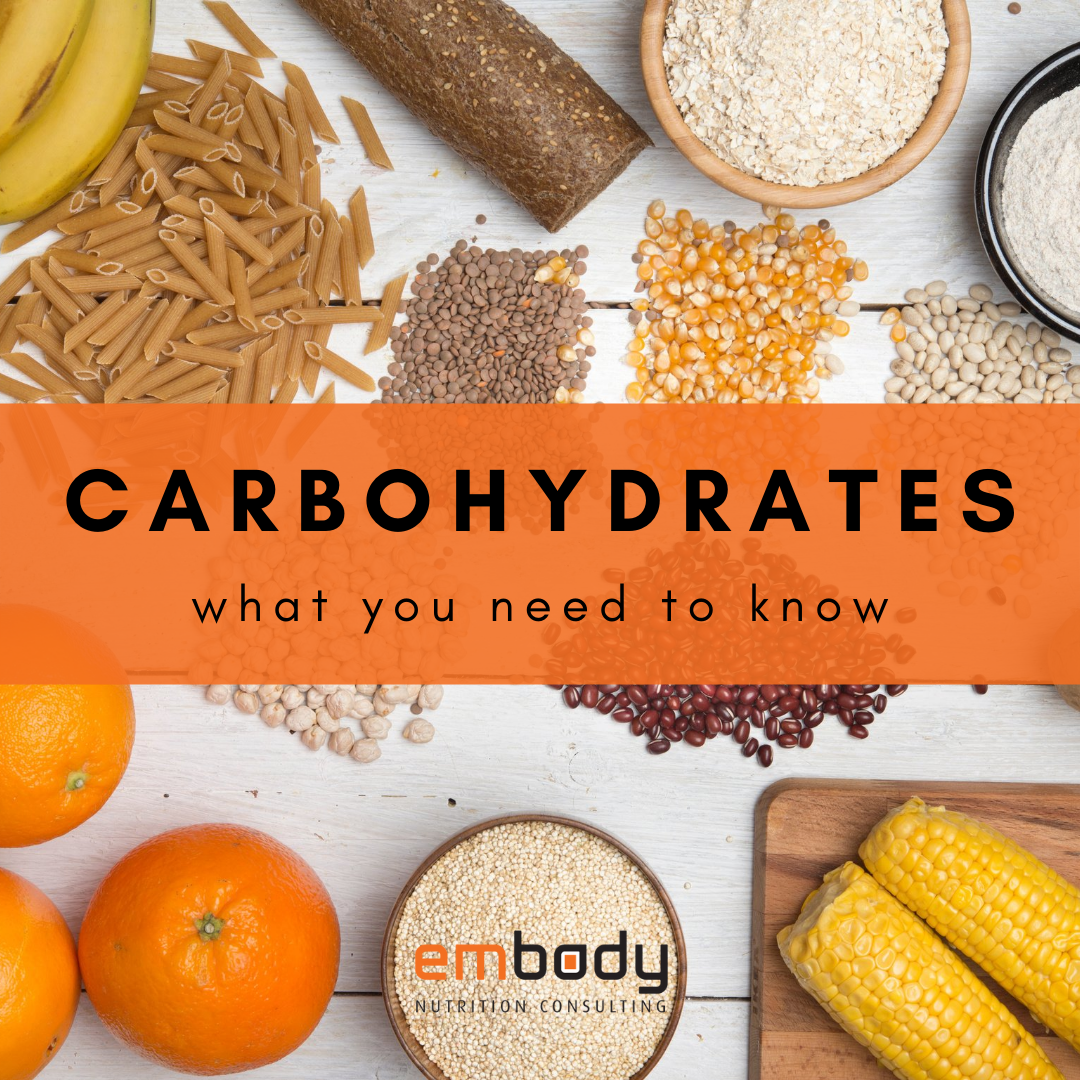Carbohydrates – the most controversial and misunderstood macronutrient of our time.
We really thought that the carb hating era would be well and truly over by now, but it just keeps popping its head up and lingering around in the nutrition world like a bad smell.
Are you confused about carbs? I’m going to take a wild guess and say yes, because it seems that every second person we chat to about nutrition is in the same boat!
In this article we aim to explain what carbohydrates actually are, what foods they are in and whether we need to eat them or not (hint: we do).
What are carbohydrates?
Our food is made up of 3 main macronutrients – protein, carbohydrates, and fat. These all provide our body with energy and are used for various functions within the body.
Most foods are made up of a combination of 2-3 macronutrients, however one will usually dominate. So many carbohydrate-based foods can also contain some protein and/or some fat.
Besides being fuel, carbohydrate foods contain many other nutrients which are vital for good health. For example, dietary fibre for satiety and bowel health, whole grains for weight management and prevention of chronic disease, plus all the vitamins and minerals that are found in many carbohydrate-based foods.
So, what foods contain carbohydrates?
Carbohydrates are found in a variety of core food groups, and it is recommended that we include these foods daily:
- Grain (cereal) foods, including breads, pasta, noodles, oats, rice, quinoa, and couscous
- Fruit
- Starchy vegetables such as potato, pumpkin, sweet potato, corn, beans and lentils
- Dairy products including milk and yoghurt
There are, of course, other refined carbohydrate-based foods which are often high in added sugar, fat and salt. These include foods such as cakes, biscuits, many fast foods, and soft drinks. These types of carbohydrates should appear less frequently in our diets.
Why are carbohydrate beneficial?
Carbohydrates are our body’s preferred source of energy. It uses them easily and effectively to help us function at our best.
When we eat carbohydrate foods, the food is broken down into smaller molecules by our digestive system. This eventually results in the production of glucose, a single sugar molecule.
Glucose in our bloodstream can then be taken up by the cells to use for most of our essential functions, or stored in our liver and muscles for use later. This enables us to fuel our muscles to move and be physically active for extended periods of time even when we aren’t eating.
Carbohydrates are also important in fuelling our training session or sporting events, as well as recovery afterwards. For more details about eating around your training, see our article here (Eating Around Your Training – Embody Nutrition Consulting).
What can go wrong when you don’t eat enough carbohydrates?
Have you ever tried eating low or no carbs in your diet? If you have, I’m sure you noticed the lack of energy (not to mention the lack of enjoyment in eating) that happens as a result.
Not eating enough carbohydrates can cause many issues and one of the biggest is feeling low in energy. Without glucose, our muscles struggle to have fuel to work properly, affecting daily activities as well as sports performance.
If we don’t have enough carbohydrates stored in our liver and muscles from eating carbohydrate foods, the body will start to break down protein for energy, meaning muscle break down can occur.
One of the biggest reasons that people will usually reduce or eliminate carbs from their diet is in the pursuit of weight loss. This will often backfire (we have seen it time and time again), firstly because the person is lacking in energy both from not eating enough overall as well as the lack of carbs themselves. Secondly, reduced carbohydrate intake will often lead to the body sending signals that it wants more carbs (hello sugar cravings!).
One important example of the need to consume enough energy, particularly for athletes, is Relative Energy Deficiency in Sport (RED-S). You can read more about this here: (Relative Energy Deficiency in Sport (RED-S) – Embody Nutrition Consulting).
Brain fog and impaired concentration are other symptoms of inadequate carbohydrate intake because our brain relies on glucose for energy.
Nausea, dizziness, and constipation can also result from a diet low in carbohydrates.
Nutrient deficiencies can occur if carbohydrate foods are excluded from the diet for extended periods of time, which can put us at risk of health issues.
If carbohydrates are being replaced by fat in the diet, this can also result in excess consumption of saturated fats and increase the risk of developing diseases such as obesity, cancer, and cardiovascular disease.
There are so many reasons why carbohydrates are beneficial in the diet. Like anything in nutrition, context is important and individual advice is key to understanding the right balance of nutrients for you.
Nutrition information can be complex, so if you would like to talk further about the role of carbohydrates in your diet (or anything else!), contact us today. We would love to hear from you!

